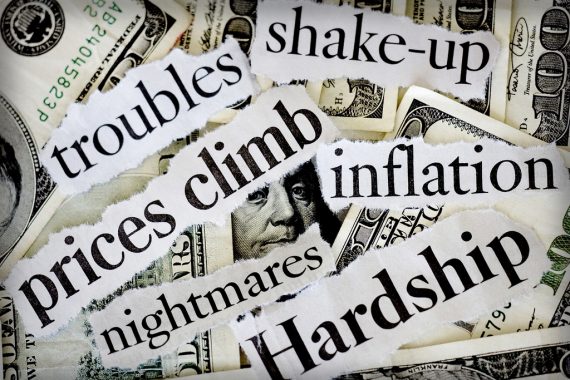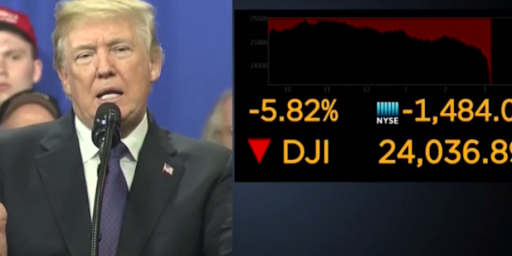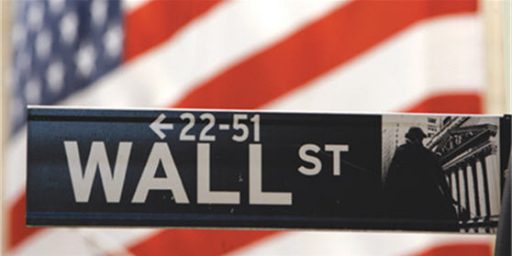Impending Economic Catastrophe Watch
To brighten up your Tuesday morning, here’s a trio of forecasts that may cause you to start stuffing cash in the mattress.
First, Arthur Laffer writes in The Wall Street Journal about the economic impact of the impending repeal of the Bush tax cuts:
On or about Jan. 1, 2011, federal, state and local tax rates are scheduled to rise quite sharply. President George W. Bush’s tax cuts expire on that date, meaning that the highest federal personal income tax rate will go 39.6% from 35%, the highest federal dividend tax rate pops up to 39.6% from 15%, the capital gains tax rate to 20% from 15%, and the estate tax rate to 55% from zero. Lots and lots of other changes will also occur as a result of the sunset provision in the Bush tax cuts.
Tax rates have been and will be raised on income earned from off-shore investments. Payroll taxes are already scheduled to rise in 2013 and the Alternative Minimum Tax (AMT) will be digging deeper and deeper into middle-income taxpayers. And there’s always the celebrated tax increase on Cadillac health care plans. State and local tax rates are also going up in 2011 as they did in 2010. Tax rate increases next year are everywhere.
Now, if people know tax rates will be higher next year than they are this year, what will those people do this year? They will shift production and income out of next year into this year to the extent possible. As a result, income this year has already been inflated above where it otherwise should be and next year, 2011, income will be lower than it otherwise should be.
Also, the prospect of rising prices, higher interest rates and more regulations next year will further entice demand and supply to be shifted from 2011 into 2010. In my view, this shift of income and demand is a major reason that the economy in 2010 has appeared as strong as it has. When we pass the tax boundary of Jan. 1, 2011, my best guess is that the train goes off the tracks and we get our worst nightmare of a severe “double dip” recession.
Laffer’s analysis seems spot-on. At the very least, I think we’re going to start seeing the stock market factoring in the impact of the tax hikes that will take effect in January, possibly resulting in sell-offs late in the year as investors decide to take profits now rather than when the higher tax rates go into effect. It’s a perfectly rational response to the impending change in government policy. Whether the repeal will also result in a recession is a question that’s above my pay-grade, but I wouldn’t be surprised if it did.
Before we get to 2011, though, one analyst believes we have more immediate concerns coming from Europe:
Bond markets could get very nasty over the coming months, while stock investors could take a few months off and stop attempting to trade volatile swings in the markets, Anthony Fry, senior managing director at Evercore Partners, told CNBC Monday.
The current problems will be with us for 5 years or more and uncertainty is very high,” Fry said.
“Sentiment is extremely volatile as shown by the collapse of the Prudential’s attempt to buy AIA. When the deal was thought up just a few months ago it was a very different world,” Fry told CNBC on Monday.
Fry says the best we can hope for in the current environment is a soft landing, but sees little chance of this happening.
(…)
“Governments need to cut spending and raise money and if they do not do so credibly will be killed by the bond market demanding higher rates,” he said.
That’s the Sovereign Debt Crisis, and it’s poised to hit the United States before long:
President Barack Obama is poised to increase the U.S. debt to a level that exceeds the value of the nation’s annual economic output, a step toward what Bill Gross called a “debt super cycle.”
The CHART OF THE DAY tracks U.S. gross domestic product and the government’s total debt, which rose past $13 trillion for the first time this month. The amount owed will surpass GDP in 2012, based on forecasts by the International Monetary Fund.
(…)
“Over the long term, interest rates on government debt will likely have to rise to attract investors,” said Hiroki Shimazu, a market economist in Tokyo at Nikko Cordial Securities Inc., a unit of Japan’s third-largest publicly traded bank. “That will be a big burden on the government and the people.”
Gross, who runs the world’s largest mutual fund at Pacific Investment Management Co. in Newport Beach, California, said in his June outlook report that “the debt super cycle trend” suggests U.S. economic growth won’t be enough to support the borrowings “if real interest rates were ever to go up instead of down.”
And higher interest rates, of course, will mean higher government spending, and higher budget deficits. Thus creating a self-sustaining process in which the debt keeps increasing, at ever higher rates, until it reaches a point where it’s simply unsustainable.
I don’t buy into the idea that the economic house of cards is about to collapse, although after the fall of 2008 I would think it would be foolish to say that it’s totally impossible, but we’re certainly headed into an era of sustained problems thanks to a debt crisis that we should have seen coming decades ago.







I am generally a pessimist, but consciously try to find counter-arguments that are persuasive.
I think Barry Ritholtz’ piece yesterday on non-a-double-dip, was pretty good. Barry’s pretty smart.
http://www.ritholtz.com/blog/2010/06/double-dip-or-just-a-soft-patch/
FWIW, he did a take down on Laffer’s piece today.
http://www.ritholtz.com/blog/2010/06/art-laffer-make-up-your-own-facts-here/
Harsh headline.
The thing I keep watching is the Consumer Metrics Institute realtime data
http://www.consumerindexes.com/
If they are as good as they say they are …. then if this isn’t a real dip, it’s at least a real soft spot.
BTW, what if the fed has privately accepted a deflationary scenario, and is only trying to make it mild, even if that makes it long?
That would hold down government borrowing costs, at the cost of … well that’s the real question, whether growth with inflation is even an option right now.
Who has this option? I know my tax rate will be higher next year, but I can’t magically start earning more money at my current job to make up for it.
Won’t the above-mentioned increase in taxes collected, which is said to be large enough to impact the production decisions of average people, offset some of that spending? How does that factor into deficit projections?
Basically, the top 5% of income earners who pay about 50% of all federal income taxes. The point isn’t that a large number of people can do this. The point is that a large proportion of tax revenue may be affected by it.
check out two devastating articles from Bruce Bartlett, one of the true founding fathers of supply side economics:
http://www.thedailybeast.com/blogs-and-stories/2009-08-12/the-gops-misplaced-rage/full
http://www.capitalgainsandgames.com/blog/bruce-bartlett/1168/supply-side-economics-rip
he also had some nice things to say about Ritholtz vs Laffer
http://capitalgainsandgames.com/blog/bruce-bartlett/1777/barry-ritholtz-takes-down-art-laffer
Three months ago, everyone was predicting that the economy would start picking up around now, but job growth has been anemic and the markets are falling.
If the consensus is now that we’re about to experience more problems, then my prediction is that the economy is going to start looking up soon.
Most hard numbers have been showing growth for the past six months, Alex. Some of them are now pausing, or turning over. Place your bets.
Well, if you are going to have tax cuts and nothing else, then it is a waste of time. We wasted eight years under Bush and he ignored the problems. The new dynamic today is globalization with 2 billion cheap laborers. All I saw was eight years of our jobs going overseas, our money going to Iraq, and the neglect of our country and infrastructure. What good are tax cuts if you lose your job. And what good are tax cuts to bring in revenue, if people lose jobs and pay no taxes and draw some government benefit. It will take some 10 to 20 years to clean up the Bush mess. You can throw ideology out the window and come up with some real economics.
Gerry, go read up on the Fair Tax.
The fair tax is a mixed bag. You still have to deal with globalization in which so many people have lost jobs or have had their wages go down. And that means less for consumers to buy and less in taxes paid if you have a fair tax.
Globalization is a separate issue and should be treated as that.
Gerry, read how the Fair Tax can provide investment incentive for foreign capital. That can bring jobs back.
As far as Bush is concerned, consider this:
I have been very critical of the way George Bush managed the economy especially his last two years, but we need to make sure that the Bush failures are put into the proper context with what is happening now. Notice the great graphic below from Heritage.
_________________
Sorry, the graphic didn’t print. Go here: http://blog.heritage.org/?p=4210
Sorry, the graphic didn’t print. Go here: http://blog.heritage.org/?p=4210
And the Dems controlled Congress from 2007 on. I’m not defending the Bush admin., I’m just trying to provide some perspective.
I don’t believe that tax incentives will bring back the jobs. It is the point that 2 billion cheap laborers want our jobs. Add up one dollar an hour, no healthcare, no retirement, no social security, no OSHA and that is the big advantage of being in China or some other country. The middle class loses.
On the Bush deficits and the Obama deficits. A person can argue over the new healthcare although that has not taken place yet.
Here is the problem that Obama inherited. Tax cuts for the here and now under Bush-all spent and useless for us today. Two wars not paid for. A financial crisis in which we had to bail out everyone to prevent a depression and 25% unemployment, a housing crisis, an auto crisis, and medicare part D. A recession means higher deficits as people lost their jobs and pays no tax. But the worst offense is that the Bush administration did not invest in our country, in our people, and in the future. This has set our country back some 10 to 20 years. His ideology failed and it has cost our country enormously with the globalization that we have to deal with today.
I know the democrats came into office in 2007, however, we already saw the deficits piling up. We already saw over 5 years ago that “stay the course” was failing. We already saw the loss of our jobs that went overseas while Bush said “free trade is good.” We already saw the failure of the Iraq war, the quagmire, not enough troops, and the wars not paid for and Bush said “stay the course.” We already saw our infrastructure falling apart as Bush was preoccupied by war. We also saw the neglect of Afghanistan as Bush was preoccupied with Iraq.
The perspective is that while democrats were not helpful, they were not running the show-Bush was. And the “stay the course-trickle down” mentality was failing long before the democrats came in. Bush was one dimensional and we had many problems to deal with. We saw those problems and it was all ignored. We are where we are today, and we see a country in a total mess.
I don’t know why people say that tax incentives will bring our jobs back. The numbers speak for themselves. Two billion people in the world want our jobs. And they get paid a dollar an hour. That is the problem. No tax incentive will ever change that dimension. Cities and states are struggling to keep jobs, and their only offense is to give tax incentives. But how long will that go on as cheap labor trumps all. We have chronic high unemployment as we go on with years of ignorance. We have to face the world as it is. And the only way to deal with globalization and our economy so that people are employed and that they become taxpaying citizens is that we have to invest in our country, in our people, and in the future. There is no room for ideology. And ideology is what the republican party is based on these days.
So how do you propose to invest in our country? What form does this investment take?
It is getting harder to do with so much time wasted.
If you want the government to get serious on employment then they have to do the following:
Fix the antitrust laws that Reagan relaxed. Monopolies and consolidations destroyed jobs.
Who Broke America’s Jobs Machine? | NewAmerica.net
2. Invest in your country: That is energy independence for security and jobs. Also a new air traffic control system that will save 12% on fuel. The savings to the airlines can go to build new aircraft. A high speed internet system. Perhaps high speed rail.
3. Invest in your people: That is mandatory vocational training. We live in a globalized world and you can no longer rely on factories. We have to be an educated society.
Hudson Institute > Promoting U.S. Worker Competitiveness in a Globalized Economy
4. Invest in the future: Federal research grants to be given to universities and business to bring out new technologies. Today there are no new jobs to go to for those unemployed. You need new areas of growth. No playing games with embryonic stem cell research.
http://www.newsweek.com/id/222836/output/prin…
5. Consider an “American job elimination tax” on companies that move out of the country. These companies do not pay middle class wages, healthcare, pensions, social security, or city and state taxes.
6. Get away from failed ideology. We saw it for 8 years. Tax cuts do not solve problems. Does not prevent recessions. And does not create prosperity. You still have to solve problems. Ideology does not solve problems.
7. Supporting small business sounds nice and it is heard in Washington, but it does not work in my community as the big business left. That means you cannot have small business as people lost their jobs. Besides, small business will never pay what big business paid in wages.
8. We are losing the middle class. We cannot compete with 2 billion cheap laborers in the world that want our jobs. There are not enough jobs to go around. Competition is good, but it can be harmful also. All we are doing in this country is build the same business environment so that we can knock the other guy out. A person loses his job and has no place to go to. And the reason is that we did not invest in our country, in our people, and in the future.
Have commissions to cut government spending. It seems to be the only approach to doing this. Obviously, one side or the other will complain, but something has to be done now.
Government appointed jobs and organizations need to be slimmed down. Every 50 to 60 years we need to go through this. There are too many secretaries, deputy-secretaries, under-secretaries, and under-under-secretaries. Information gets loss through the process and government becomes ineffective. The last time this was done was with the Hoover Commission in the late 40’s.
Doing the above 10 steps, you will have a slimmed down and more effective government. You will create jobs, save the middle class, and save the country.
“Three months ago, everyone was predicting that the economy would start picking up around now, but job growth has been anemic and the markets are falling.”
Well, here’s one person who isn’t “everyone”: me.
Sadly, things appear to be unfolding just about as I have been predicting here, and at GEye. I hate it when I’m right.